Coronavirus and lockdown: What is the latest?
- Published
- comments
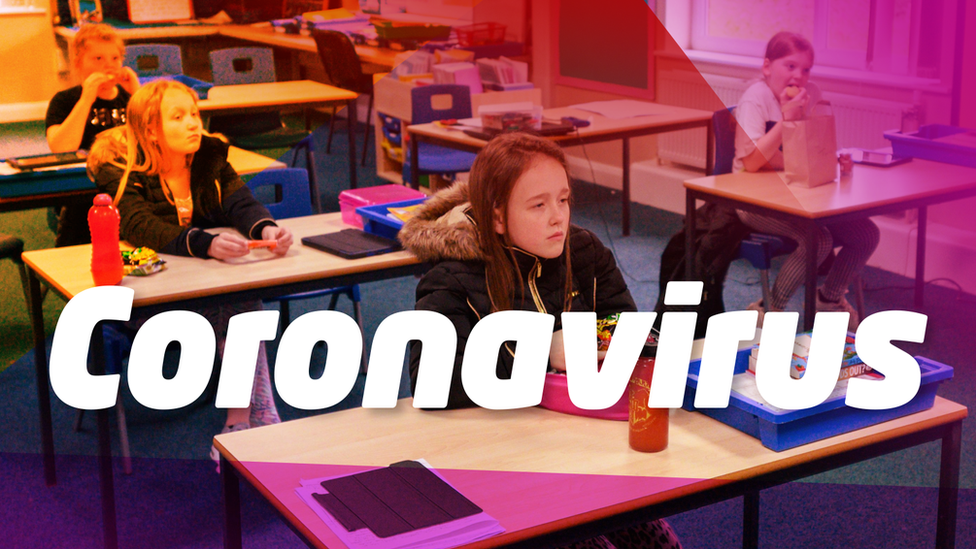
The United Kingdom went into lockdown on 23 March to try to combat the spread of coronavirus.
In that time there have been enormous changes to people's daily lives, huge challenges for the NHS and schools have been closed for long spells.
Coronavirus is a new flu-like virus spreading around the world. The virus causes an illness called Covid-19, though lots of people still refer to the illness as 'coronavirus' as that is how it was known at first.
Scientists and governments are working hard to stop the spread of the coronavirus and find a vaccine. Here's the latest on what's being done about it.
What does 'lockdown' mean?
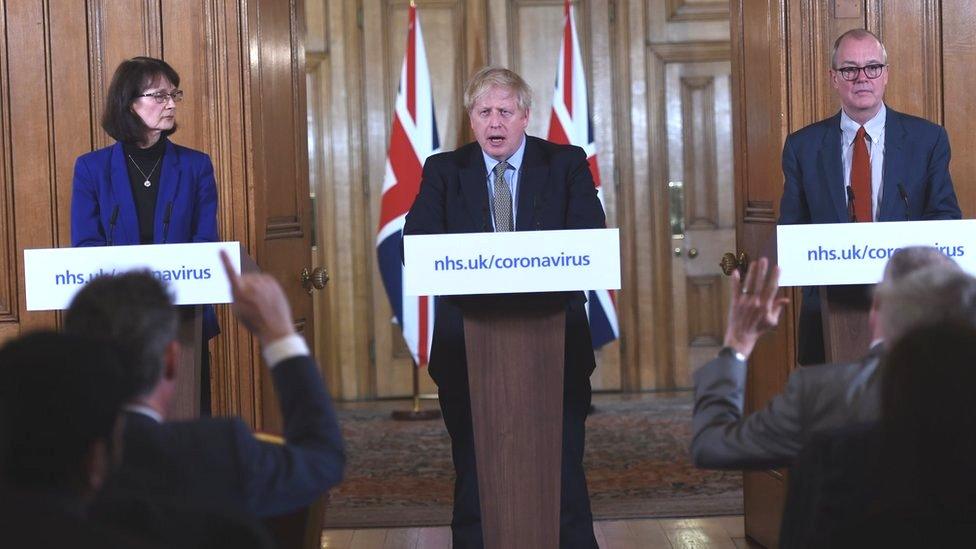
Deputy Chief Medical Officer Dr Jenny Harries, British Prime Minister Boris Johnson and Chief Scientific Adviser Patrick Vallance explain the government's plans to tackle the coronavirus outbreak.
Prime Minister Boris Johnson announced new rules in March which meant people could only leave home for essential shopping, or to care for someone elderly or vulnerable.
Even schools were closed to all children except those of key workers and those who needed special help.
People were told they could leave the house to exercise but only once a day and away from other people if they do not live in the same house.
Only shops selling really important things like food, medicine and home maintenance items were allowed to stay open - the rest were told to shut. People called this a "lockdown".
Lockdown measures were also introduced by leaders in Scotland, Wales and Northern Ireland.
More: Why are there different rules in different parts of the UK?
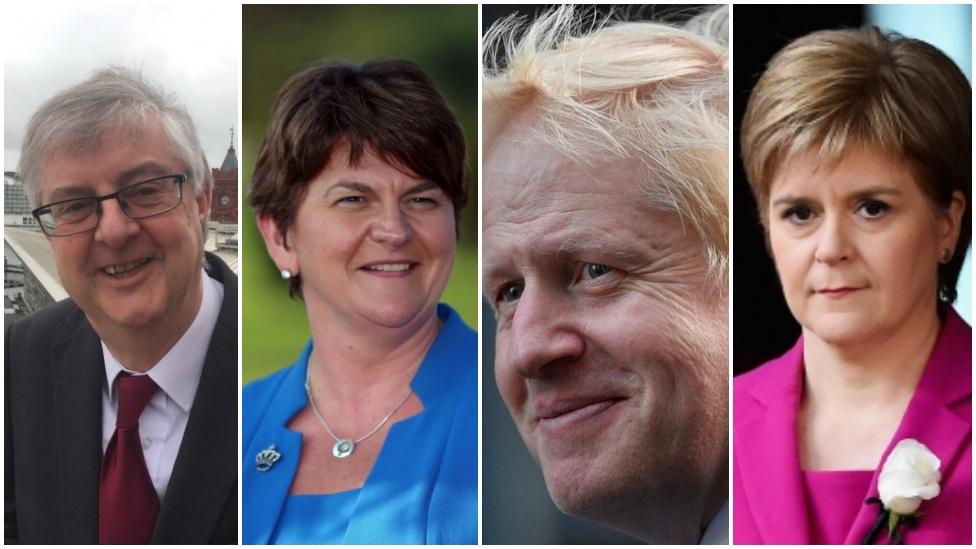
The leaders of the UK nations: Welsh First Minister Mark Drakeford, Northern Ireland's First Minister Arlene Foster, Prime Minister Boris Johnson and Scottish First Minister Nicola Sturgeon
Lockdown easing and going back to school
The lockdown rules are regularly reviewed and each country has been gradually relaxing the rules since May.
For example, people from different households can now meet indoors, as long as they keep up social distancing. It's important for people to keep their distance from others as it helps to stop the virus being passed on to other people.
Some school pupils in England were allowed back to class before breaking up for the summer holidays and all schools in England and Wales are returning in September. Schools in Northern Ireland reopen on 31 August and in Scotland, all pupils started returning to the classroom from 11 August.
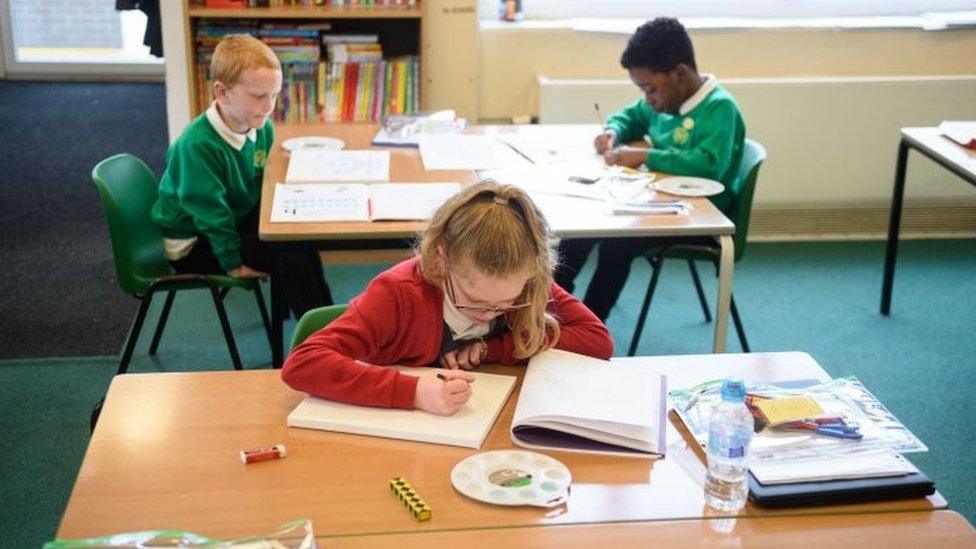
Some primary school pupils in England began returning to classrooms at the beginning of June
Many shops and facilities have reopened across the UK and each government has set out plans for how more things can reopen in the coming weeks and months.
The rules on who can meet up, how many of them, and where are also changing regularly - and they are different in each country.
For example, children in Scotland aged 11 and under are allowed to play games and have hugs with each other, grandparents and adult family members. Wales also ended social distancing for under-11s in early August.
Sporting events

Liverpool have lost just one Premier League game all season
Lots of big sporting and music events have been postponed - including the Olympics and Paralympics, the Euro 2020 football tournament which was due to take place this summer, and the Glastonbury festival - to avoid the risk of the virus spreading in crowds.
Football across the UK was stopped for several months but in June Premier League football restarted.
Crowds weren't allowed to attend, with games taking place behind closed doors to stop the spread of coronavirus among fans all gathered in one place.
However, plans to let more fans into sporting events in England are being worked on and a limited number of spectators are to be allowed into some football, rugby and cricket matches in the coming weeks.
How long until we get back to normal?
Although lockdown measures are being gradually eased in each country, getting back to normal all depends on the number of infections continuing to fall.
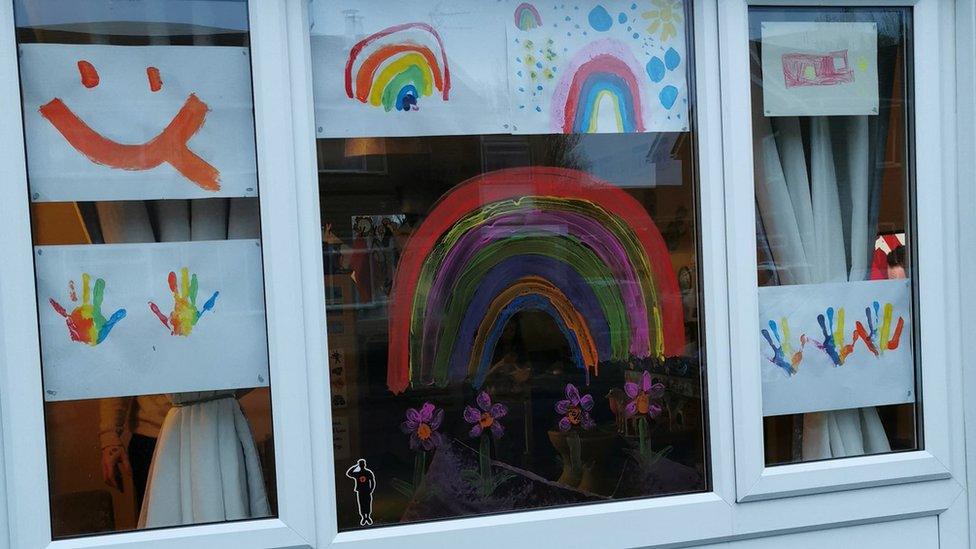
People have been putting pictures of rainbows in their windows as a message of support during the lockdown
An alert system was launched in May to help tell people how the country is dealing with the pandemic and how high the rate of infection is.
The alert system has five levels, with five being the worst, meaning lots of people being infected, and one being the best, with no cases of coronavirus. Some changes are being allowed because we are moving to lower alert levels, the government says. The UK moved from level four to level three on 19 June.
Adults who cannot work from home have been allowed back to work in England, where some children returned to school before the summer break - although the government changed its mind about getting all primary school children back to class before the summer holidays.
Summer Term in Lockdown - A Newsround Special
However some areas have seen coronavirus cases rise, and lockdown measures can be reintroduced in local areas when this happens - this happened in Leicester recently.
In other parts of the country where more cases have been recorded, people have been told to take extra steps to stop the virus spreading. On 31 July, large parts of northern England were told people there should not be visiting family and friends at their homes until infection rates fell again.
On the same day, Mr Johnson announced some forthcoming changes to lockdown, such as reopening bowling alleys, were going to be postponed.
'Track and Trace'
What is a contact tracing app and how does it work?
Each country has also set up a system to try to track who may have coronavirus and to alert other people they might have been in contact with.
Successful track and trace systems will help to control the the virus and will also help to tell the people in charge when it's safe to ease restrictions - or if restrictions need to be put back in place.
A phone app to help with this was tested by the UK government in the Isle of Wight before being dropped, though a new version is being tested again. Northern Ireland launched its own app for grown-ups to use at the end of July.
Testing people to find out if they have the virus is also really important. It can help the government track cases and make sure they are looking after those who are ill, and stop them passing it on to others.
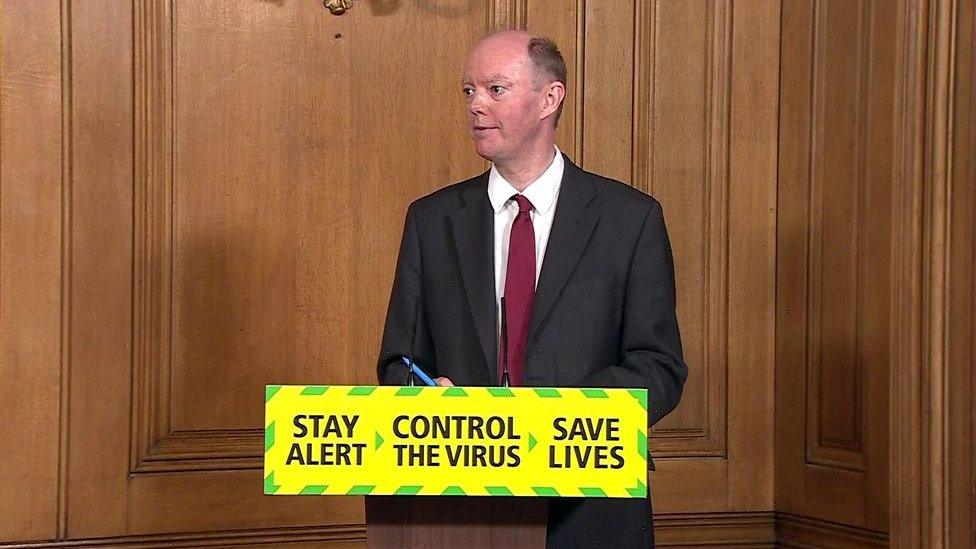
Professor Chris Witty is the UK's chief medical advisor
Experts including the UK's chief medical adviser, Professor Chris Whitty, and Sir Patrick Vallance, the UK's chief scientific adviser, have been giving regular updates to explain why the actions they are taking can help tackle coronavirus. Briefings have been held in each UK country every day but now only take place in England when the government wants to make an important announcement.
Prof Whitty has said some sort of social distancing is likely to go on until a vaccine or medicines to help treat Covid-19 are available, which could take until next year.
Dominoes show how social distancing can help
What if you feel ill?
People showing symptoms of coronavirus have been told to self-isolate - which means staying at home and avoiding contact with anyone else.
The UK government says you must do this for 10 days - it was extended from seven days by the government at the end of July.
Anyone who lives in the same house as someone with these symptoms should also stay at home for 14 days.
Other advice people are being told to follow is to only use the NHS (National Health Service) - that means going to hospital or the doctors - when it's absolutely necessary. People should dial 111 rather than going to their doctor or to an NHS hospital. If it's an emergency, you must still call 999.
Travelling to other countries
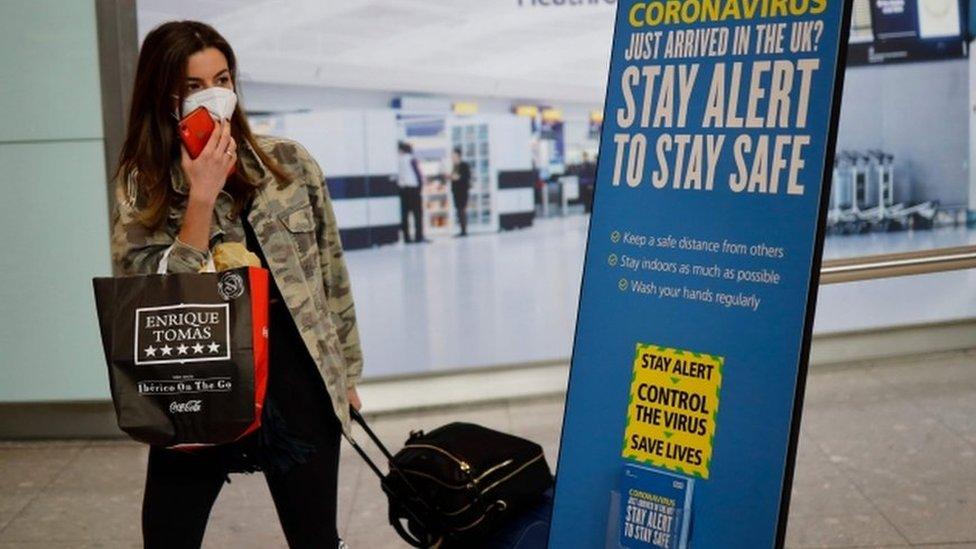
Since 8 June, all people arriving in the UK have been told to self-isolate for 14 days.
Those arriving by plane, ferry or train - including UK nationals - have to provide an address where they will self-isolate and face fines of up to £1,000 if they do not follow the rules.
However, the UK government has created a list of 59 countries which people returning or visiting from no longer need to self-isolate for 14 days.
It says these places now pose a "reduced risk" from coronavirus, so people can go on holiday there.
There is a slightly reduced number of countries on the list for people in Scotland and Northern Ireland.
Spain was on the list of countries but taken off the list after a rise in cases there, which means people returning from holiday having to place themselves under quarantine when they get back. France was also removed from the list in late August after a rise in the number of cases there too.
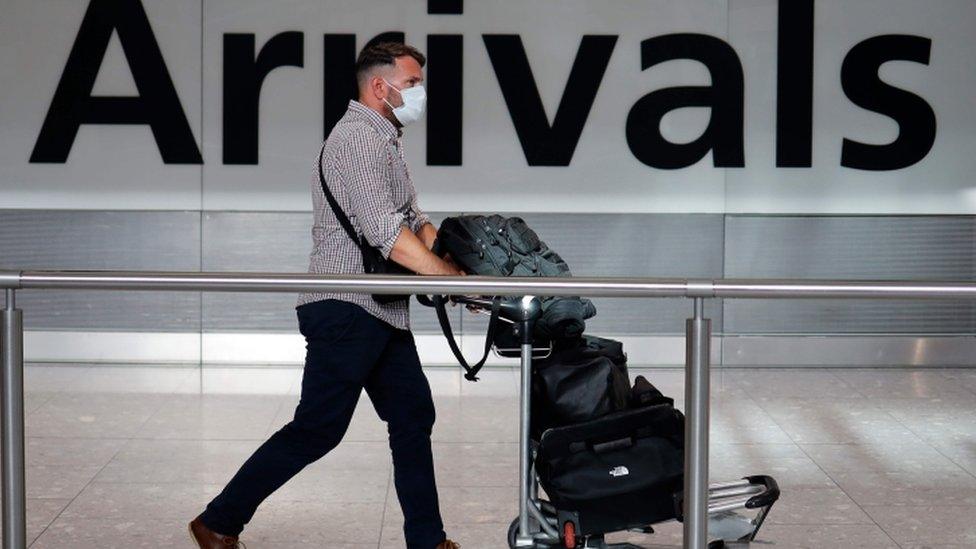
The majority of people arriving in the UK now will have to quarantine for 14 days
What about masks?
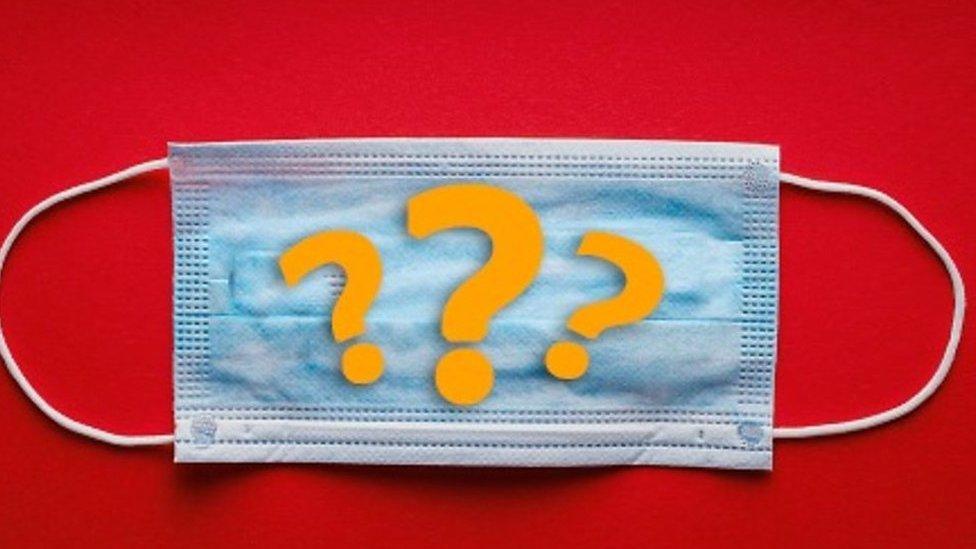
It is now compulsory for people in England, Scotland and Northern Ireland to wear face coverings in public transport or if they go into shops and supermarkets.
People in England and Scotland also have to wear masks in indoor places where they might meet other people - such as the cinema, or in museums.
People in Wales should wear masks on public transport - but the law doesn't require them to wear them in shops.
Some people - for example if they have breathing disabilities - don't have to wear them. Some children don't have to wear them either - although it depends which country you live in, as the rules vary in different part of the UK.
Secondary school pupils in Scotland, Northern Ireland and parts of England under local lockdown are being asked to wear masks in communal school areas. Wales is waiting for more information from experts before making a decision on this.
The World Health Organization (WHO) - that's the part of the United Nations whose aim is to look after the health and wellbeing of people around the world - says medical masks only need to be worn by people with symptoms or by carers or medical professionals looking after people with Covid-19.
However it also says face coverings should be worn in busy areas where social distancing is not possible.
What's happening outside the UK?
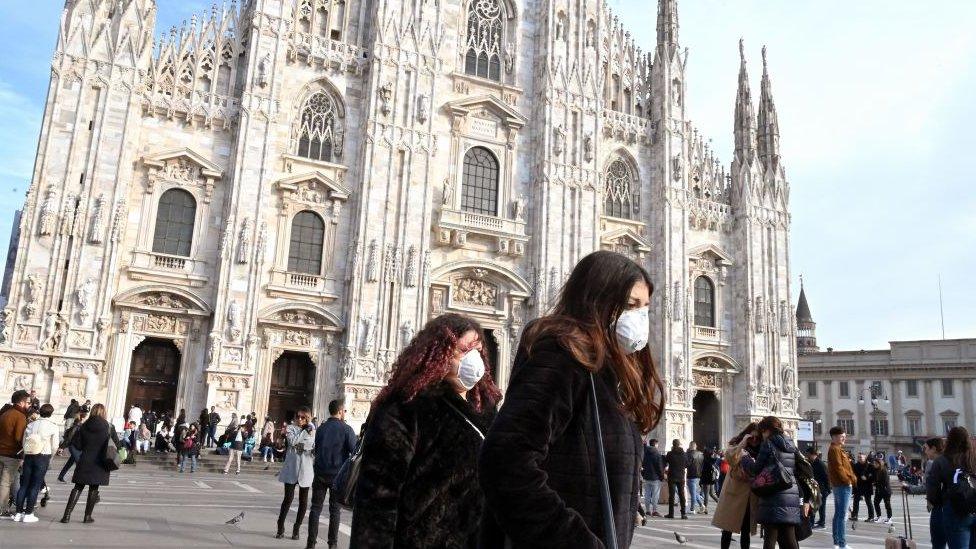
Countries like Italy have relaxed their rules on lockdown - but there are still strict measures in place
As of 26 August there had been more than 24 million cases of coronavirus in 188 countries around the world. While most people recover, many people have died.
Almost half of all cases reported so far are from just three countries: the US, Brazil and India.
The UK, Italy, France and Spain have been the worst-hit European countries.
It's been estimated that about 4.5 billion people - more than half the world's population - have had to live with social distancing measures.
Lockdown measures are being slowly lifted in phases across most parts of the world. Shops are reopening and many children are back in school - although lots of places are insisting that people wear masks in public places and keep social distancing in place.
Some countries have seen a rise in cases after lifting lockdown restrictions and have taken fresh action to try to control the virus.
What is coronavirus and how did it start?
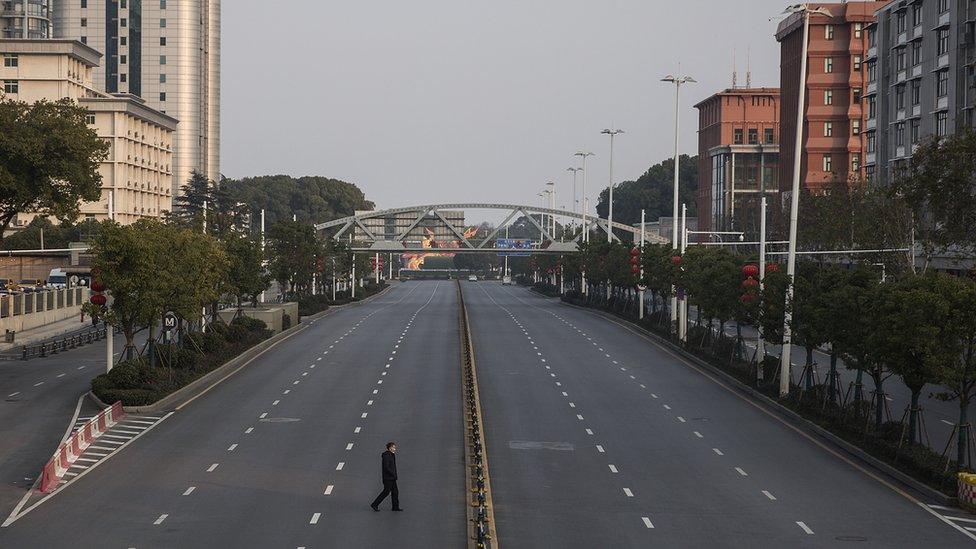
The streets of Wuhan, in China, were pretty quiet after the government locked the city down
The virus has been declared a pandemic by the World Health Organization, or WHO.
A pandemic is a disease that spreads in a number of countries around the world at the same time.
The first cases were identified in Wuhan, a city in China. It is thought it might have come from bats at a wildlife market there.
The WHO is a special group, which is part of the United Nations.
It was formed in 1948 and its aim is to look after the health and wellbeing of people around the world.
Since it began, it has done lots of medical work. For example, it helped to rid the world of the smallpox disease - the first disease to ever be officially wiped out by human effort.
The organisation is full of scientists and doctors who are helping to improve world health by stopping the spread of diseases and educating people about being healthy.
It also holds World Health Assemblies at which people discuss new diseases or disorders, and how they can be treated.
How does coronavirus affect people?
The coronavirus is a respiratory virus - that means it affects people's breathing and lungs. Like the cold and flu bugs we get in the UK, it can spread from person to person by coughing, or contact with contaminated surfaces or skin.
It can lead to more serious illnesses like pneumonia. This is dangerous for vulnerable people, such as the very old or people who are weaker due to other illnesses.
The disease has been linked to a large number of deaths in the UK, and health officials say that most of these were elderly people, or people who already had other health issues. Symptoms include fever, a cough, and a loss of smell or taste.
Can coronavirus be treated?
How do vaccines work?
Because it is a new virus, there's currently no vaccine or medicine available yet to treat it - although lots of scientists around the world are working hard to develop one.
The UK government is investing in a vaccine that is currently being developed at the University of Oxford - tests are already being carried out on people to see how they react to it, and the early results have been positive.
However, there is a chance it might not work, or it could take around 18 months for it to be ready because it will have to be tested to make sure it is safe to use. Until then, the only way to prevent it spreading is to limit physical contact with people who have the virus.
Doctors says properly washing your hands is one of the best ways to help reduce the spread of the virus.
How to wash your hands
Lots of money is being spent by different governments to find out more about the virus too - knowing more about it increases the chances of being able to deal with it.
Scientists are also trying out existing drugs to see if they can help treat people who become unwell. One of these, an anti-inflammatory drug called dexamethasone, is being used in hospitals to help people who are most seriously ill because of coronavirus.
- Published19 May 2020
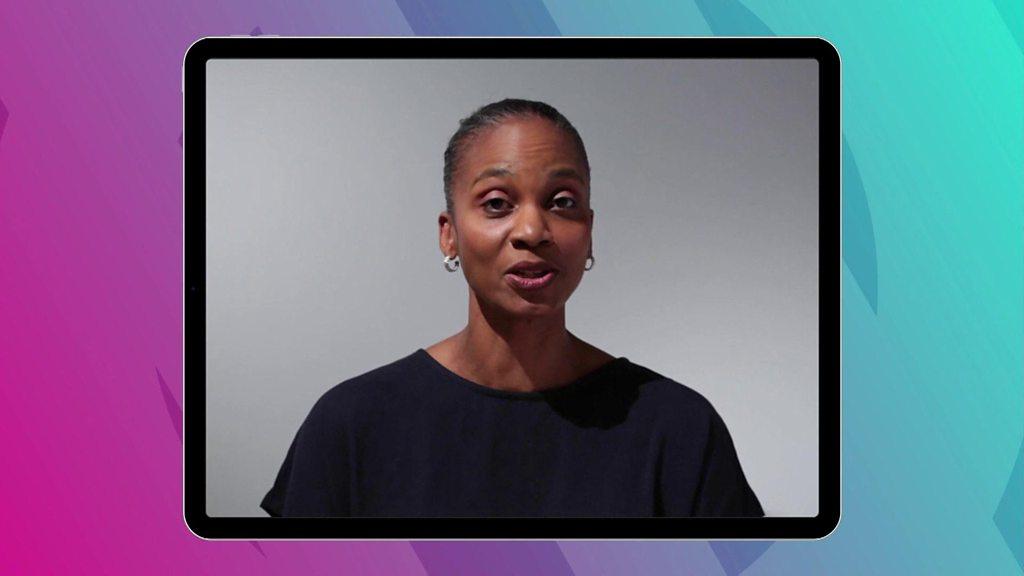
- Published13 March 2020
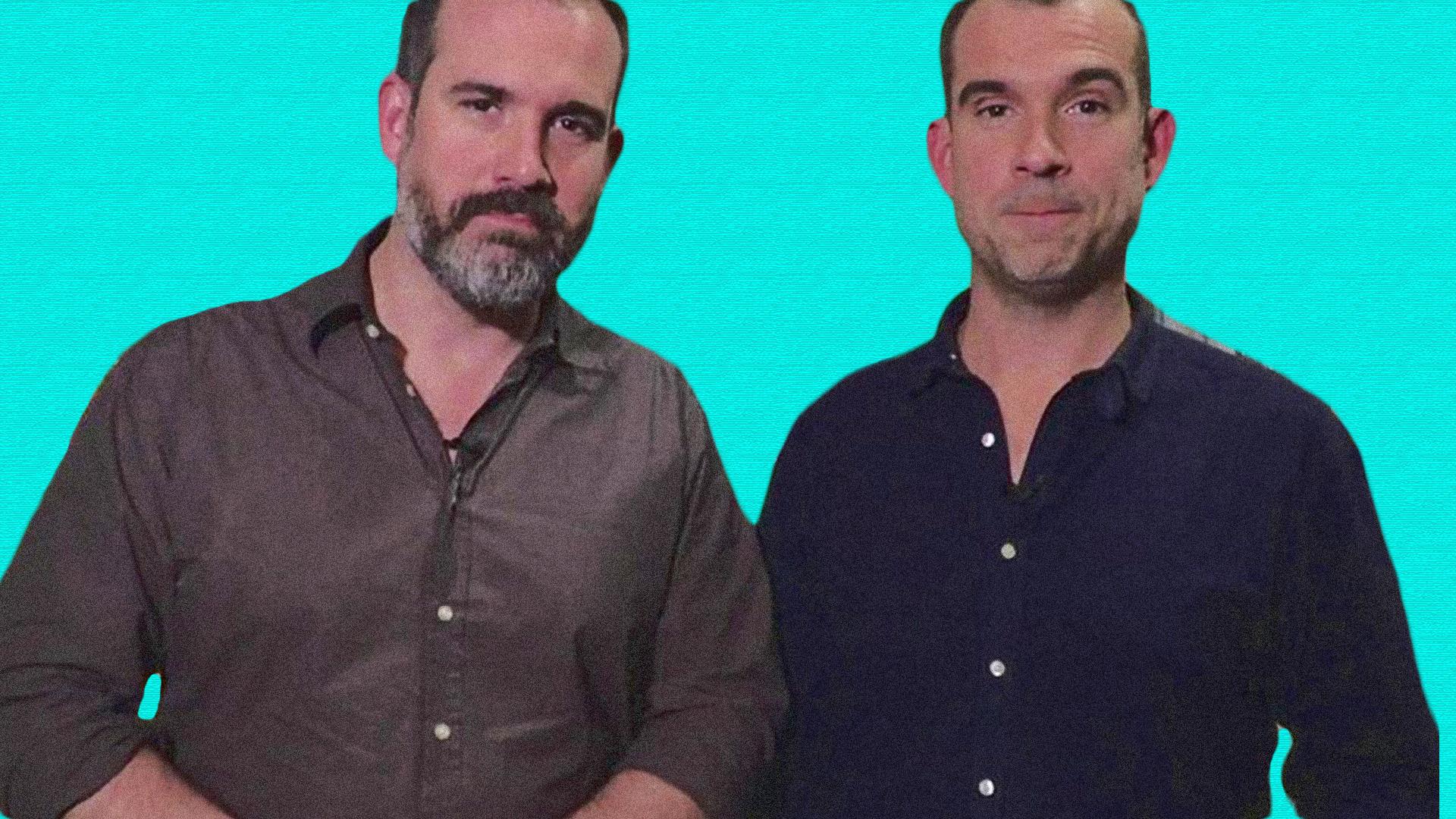
- Published27 August 2020

